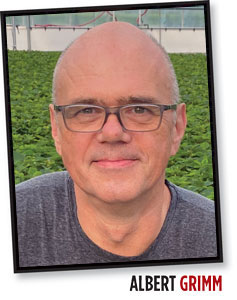6/1/2022
Should You Hire a Consultant for Your Greenhouse?
Albert Grimm

I came across an interesting question in a grower chat: Should we use a consultant to help us with issues that we may have in the greenhouse? You may think: Come on, who needs consultants in the information age? The answer to this question, however, has nothing to do with information, but with learning. Consultants help us not by spreading information, but by showing us what we need to learn.
There’s some truth to the proverbial stubbornness of farmers. Most of us have a hard time accepting advice. We don’t like being told that we’re doing something wrong. The Internet has made this worse. After two decades of data inundation, we tend to apply confirmation bias to anything we see, hear or read. We’re conditioned to filter out everything that doesn’t confirm what we already believe. This protects us from getting overwhelmed by information, but it created the expectation that our thoughts will be reinforced rather than questioned. Consequently, we tend to select sources of grower information that exploit this bias, rather than seek to break it.
This is a perilous reality for consultants who ought to tell growers what they WANT to hear, or else they risk losing their popularity and income. To be effective, however, consultants should tell growers what they NEED to hear. The value of consultants lies not in the information that’s being delivered, but in breaking through this cognitive bias of growers and helping them step outside their comfort zone. The best consultants are those who’ve perfected the art of teaching growers how to embrace criticism as a learning tool.
I had my first encounter with a good consultant on the first day both of us started to work for a new company. Early that morning I met my new bosses and this consultant in the parking lot. We shook hands and I followed the group into the greenhouse. I was waiting for someone to tell me what to do, but a few yards inside the greenhouse the consultant turned around abruptly and told me sharply: “What are you doing? Don’t just follow us around! Go find yourself something to do!”
This was not what I’d wanted to hear. I was waiting to be addressed with instructions that would respect my expertise. Instead, I was brusquely sent off to the fields in front of the assembled management. I felt deflated and insulted. This greenhouse, however, was one big mess. I’d been hired to clean it up. I found a group of workers and joined them in attaching overgrown tomato vines to the high wire. Working side by side, I was able to introduce a method to my coworkers, which reorganized us into tandem teams. It allowed us to do the same work faster, easier and with less damage to the crop. By the end of the day, I’d bonded with my new colleagues and we were happy about our progress. I could have never accomplished such instant results if this consultant hadn’t pushed me out of my bubble and into reality. When we met at the end of the day, he just smiled and gave me a thumbs up.
Perhaps the most effective form of consulting are the study clubs of Dutch growers. Greenhouses take turns in hosting tours for their competitors. The visiting growers are invited to comment on what they find. Critique comes bare-knuckled, direct and honest. At times, the poor host of such a tour has his crop and his methods verbally torn to shreds by the guests. Indeed, this is the idea behind study clubs. They’re a platform for unfiltered, honest feedback and the growers use this criticism to learn and improve.
I was exposed to a study club experience when a grower from Holland came to visit my greenhouse in Canada. I hadn’t heard of study clubs and my boss didn’t prepare me for what was to come. I was mighty proud of my accomplishments, but this visitor found fault with everything he saw. By mid-afternoon my morale was destroyed, and I was ready to hand in my keys and quit on the spot. At that moment, my boss and this consultant-grower took me by the shoulder, invited me for an excellent dinner and explained that I’d just experienced the most effective form of learning.
Most of us are simply not aware of any mistakes we make or else we would avoid them. If we’re unaware of our flaws and deficiencies we cannot improve upon them, and therefore, honest critique is the most valuable professional gift that anybody can present us with. If you’re ready to accept critique, you’re ready for a consultant. GT
Albert Grimm is head grower for Jeffery’s Greenhouses in St. Catharines, Ontario, Canada.